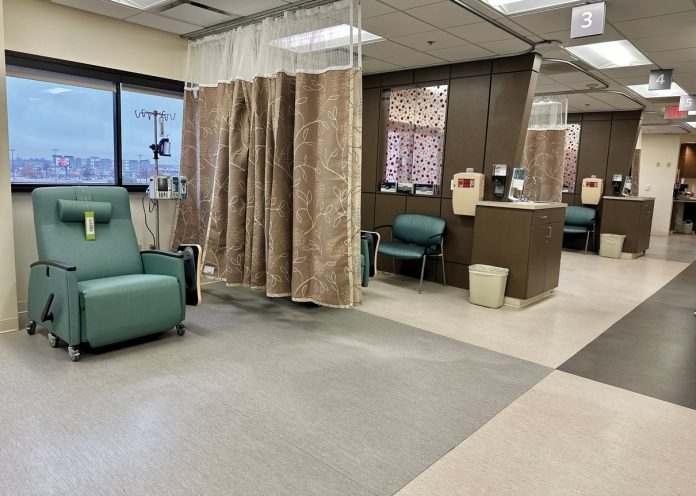Mercy has expanded outpatient infusion services for patients who need intravenous treatments and medications. Mercy Infusion Services is now open in the McAuley building on the campus of Mercy Hospital Oklahoma City.
Infusion therapy may be needed when a patient’s condition cannot be treated effectively by pills or other oral medications. Non-cancer infusion therapies are a fast-growing option to treat conditions related to gastroenterology, neurology, rheumatology, nephrology, endocrinology and more.
“In the last decade, there has been an explosion of new therapies to treat previously devastating neurological conditions like multiple sclerosis, myasthenia gravis, and migraines, and almost all of these new treatments involve infusions,” said Dr. Tyler Webb, neurologist at Mercy Clinic Neurology in Oklahoma City. “We are optimistic about the very real and near future of neurologic medicine. It’s clear infusions will play a major role in the way we manage these conditions going forward, and more clinics will be needed to administer them safely and comfortably.”
At Mercy’s Gastroenterology and IBD Center, Dr. Hussein Bitar specializes in the treatment of inflammatory bowel diseases. The growing center helps patients with moderate to severe Crohn’s disease and ulcerative colitis access the latest biologic treatments.
“Patients with inflammatory bowel diseases often experience severe dehydration and need fluids and regular iron infusions, both of which need to be delivered intravenously,” Dr. Bitar said.
As the treatment options have grown, so has the need for additional space to serve more patients.
Oncology patients will continue receiving IV infusions and chemotherapy at Mercy’s cancer center inside the Coletta Building. With the new McAuley building location, Mercy is now able to offer a second infusion treatment center for non-oncology patients.
“We exist to serve patients in need, and we’re so excited to be able to serve more people,” said Lori Moore, manager of infusion services at Mercy. “Having more space means we can increase access to care for more patients in both of our infusion centers, creating more capacity for cancer patients and patients with a variety of needs.”
The bright, newly renovated suite includes 14 chairs and the ability to treat 50 patients each day. Two private isolation rooms are available to accommodate patients with highly infectious GI or respiratory viruses.
Patients must have an order from a physician to receive infusion treatment at the new center.
Available therapies include:
• Iron infusions
• Blood infusions
• Phlebotomies
• Cortisol stimulation testing
• Port draws
• Antibiotics
• Injections
• IV fluids and hydration
• Electrolyte replacement
• Hydration for pregnant patients or patients experiencing nausea
• Neurology, rheumatology, nephrology, endocrinology medication services
• Immunotherapy
• Complex biologics
• Migraine protocols
• Plasmapheresis
• Blood exchanges
• PICC line placement













